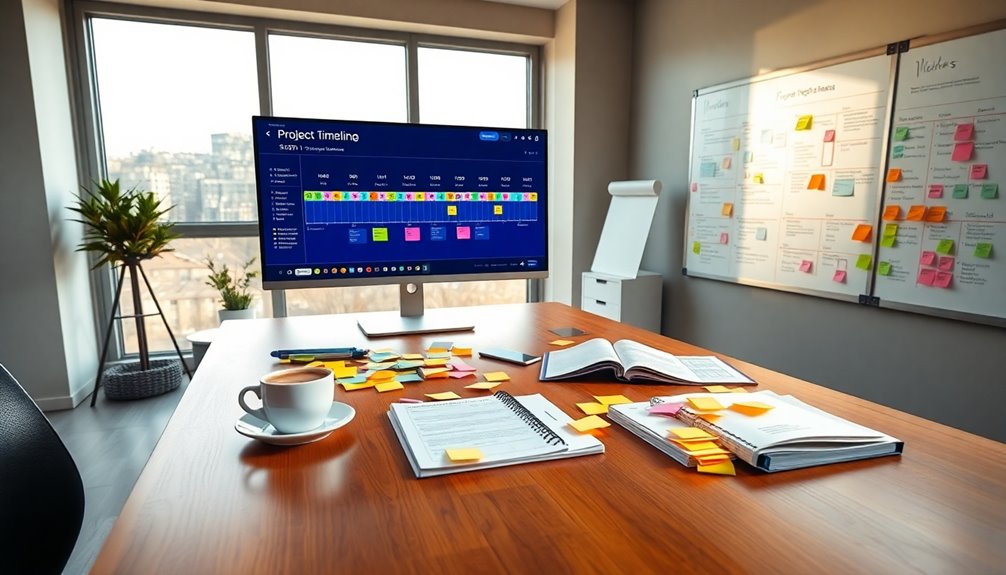Tackling a big project doesn't have to feel overwhelming. Start by defining your clear goals to create a focused roadmap. Break the project into smaller, manageable tasks, and prioritize them based on urgency and importance. Create a timeline with milestones to track your progress. Stay flexible, as adjustments may be needed along the way. Don't forget to celebrate small wins to keep your motivation up. Also, incorporate regular breaks to boost your productivity and creativity. By using these strategies, you can navigate your big project with confidence and clarity. There's more to explore on keeping your project stress-free.
Understand Your Project Goals
Understanding your project goals is essential for success. When you clearly define your project objectives, you create a roadmap that guides your efforts.
Start by identifying what you want to achieve and why it matters. This clarity helps you maintain goal alignment throughout the project, ensuring that every task you undertake supports your ultimate vision. Additionally, establishing specific objectives for your project can enhance focus and reduce ambiguity. Regularly reviewing and adjusting your goals is crucial for maintaining optimal health in your project's progress.
Engage your team in discussions about these objectives; their insights can refine your goals and foster a shared commitment.
Regularly revisit these goals to measure your progress and adjust your strategies if needed. By keeping your project objectives front and center, you'll not only stay focused but also motivate your team to work collaboratively towards a common purpose. Additionally, setting SMART goals enhances clarity and focus, making it easier to track progress and maintain motivation throughout the project.
Break It Down
When you tackle a big project, breaking it down into smaller parts makes it manageable.
Start by identifying key milestones to mark your progress, then set specific tasks for each step. This approach helps you stay focused and motivated as you move forward. Additionally, establishing measurable benchmarks for each task allows you to track your progress effectively and adjust your plans as needed. Incorporating mindfulness practices can also help you maintain mental clarity and enhance your ability to manage stress throughout the project. Remember to celebrate your achievements, as acknowledging accomplishments boosts self-esteem and keeps you motivated for the next steps.
Identify Key Milestones
To successfully navigate a big project, breaking it down into key milestones is essential. This approach not only simplifies your workload but also helps with milestone tracking and necessary adjustments along the way.
Consider these key milestones for your project:
- Research and Planning: Lay the groundwork for your project.
- Initial Draft or Prototype: Create a tangible version of your idea.
- Feedback and Revisions: Gather input and make necessary changes.
- Final Review: Verify everything aligns with your goals.
- Launch or Completion: Celebrate reaching the finish line!
Set Manageable Tasks
Breaking down your project into manageable tasks not only makes it less overwhelming but also allows you to focus on one step at a time.
Start by identifying the individual components of your project and listing them out. Use task prioritization strategies to determine which tasks are most critical and should be tackled first. This helps you allocate your energy efficiently.
Don't hesitate to implement effective delegation techniques, either; if certain tasks can be handled by others, let them step in. This not only lightens your load but also fosters teamwork.
Create a Timeline

Creating a timeline is essential for keeping your big project on track.
By setting milestones and deadlines, breaking tasks into phases, and using visual planning tools, you'll guarantee that each step is clear and manageable. Regularly reviewing prioritized lists ensures that your focus remains on the most critical tasks. To further enhance your timeline, consider incorporating structured approaches that can streamline your workflow and reduce the feeling of overwhelm.
This structured approach helps you stay focused and motivated throughout the process. Additionally, incorporating task and time management techniques can further enhance your ability to stay organized and efficient.
#
Set Milestones
and Deadlines
While tackling a big project can feel overwhelming, setting milestones and deadlines helps you break it down into manageable parts. By implementing milestone tracking, you can visually see your progress and stay motivated.
Here are some key elements to reflect on:
- Define specific milestones that align with your overall goal
- Set realistic deadlines for each milestone to promote accountability
- Regularly review your progress and adjust deadlines as needed
- Celebrate achievements at each milestone to maintain enthusiasm
- Keep a visual timeline to remind you of upcoming deadlines
With these strategies, you'll navigate your project more effectively, making necessary deadline adjustments along the way.
Break Tasks Into Phases
To effectively manage a big project, it's crucial to break tasks into distinct phases, allowing you to focus on one segment at a time.
Start by identifying all the tasks involved and then categorize them into project phases. This approach helps with task prioritization, making it clear which tasks need your immediate attention.
For each phase, set realistic timelines to maintain momentum and prevent overwhelm. Assign deadlines for each task, ensuring you stay accountable and on track.
As you complete one phase, you can celebrate your progress and prepare for the next. By dividing the project this way, you'll find it easier to manage your time and energy, ultimately leading you to a successful outcome.
Use Visual Planning Tools
Once you've broken your project into phases, using visual planning tools can greatly enhance your organization and clarity.
Creating a timeline through visual mapping or flow charts helps you visualize each step, making it easier to track progress.
Here are some key benefits of using these tools:
- Clear timelines: See your deadlines and milestones at a glance.
- Enhanced focus: Stay on track by visualizing your priorities.
- Identified dependencies: Understand how tasks relate to one another.
- Motivational visuals: Celebrate progress with visual cues.
- Improved collaboration: Share your flow charts with team members for better communication.
## Set Milestones
Setting milestones is essential for breaking down a big project into manageable parts, ensuring you stay on track. By establishing clear milestones, you can enjoy several milestone benefits, such as increased motivation and a clearer sense of progress.
When you achieve a milestone, it's a moment to celebrate your hard work, which can invigorate you to tackle the next phase. Additionally, implementing a reward system can provide further incentives for completing each milestone successfully. Regularly assessing your progress can help reinforce your goal orientation and keep you focused on the bigger picture.
For effective milestone tracking, divide your project into smaller, time-bound goals. This way, you can regularly assess your progress and make necessary adjustments. Additionally, maintaining a positive mindset throughout the project can enhance your motivation and resilience as you navigate challenges.
Prioritize Tasks

While juggling multiple tasks, prioritizing them can greatly enhance your productivity and keep your project on track.
To implement effective prioritization strategies, consider these task prioritization techniques:
- Identify urgent vs. important tasks to tackle what truly matters first.
- Use a scoring system to rank tasks based on their impact and urgency.
- Break large tasks into smaller, manageable steps to prevent overwhelm. This approach not only simplifies the process but also aligns with the principle of eliminating distractions to maintain focus. Additionally, applying time limits for each task can further enhance your ability to stay on track and avoid burnout.
- Review your priorities regularly to adapt to any changes in project scope.
- Limit your daily focus to three key tasks to maintain clarity and momentum.
Recognizing the purpose behind challenges can provide clarity, helping you to shift your perspective on how you approach your tasks.
Delegate Responsibilities
Delegating responsibilities is essential for managing large projects effectively. When you distribute tasks among your team, you not only lighten your own load but also promote team collaboration.
Start by identifying the strengths and weaknesses of each team member. This way, you can assign tasks that align with their skills, ensuring that everyone feels engaged and motivated.
Clear communication is key; make sure everyone understands their roles and deadlines. Regular check-ins can help keep the team on track and address any challenges that arise.
By embracing task distribution, you foster a sense of ownership within the team, driving productivity and creativity.
Ultimately, effective delegation leads to a more cohesive effort, turning a challenging project into an achievable goal.
Use Project Management Tools

When tackling big projects, choosing the right project management tool can make all the difference.
It helps streamline communication processes, ensuring everyone stays on the same page.
Let's explore how these tools can enhance your project's efficiency.
Choose the Right Tool
Choosing the right project management tool can make all the difference in how efficiently you tackle a big project.
With so many options out there, it's vital to conduct a thorough software comparison to guarantee your tool selection meets your needs.
Here are some features to take into account:
- User-friendly interface: Simplifies navigation and reduces the learning curve.
- Collaboration capabilities: Allows team members to work together seamlessly.
- Task tracking: Helps you monitor progress and deadlines effectively.
- Reporting features: Provides insights into performance and bottlenecks.
- Integration options: Secures compatibility with other tools you already use.
Streamline Communication Processes
Effective communication is essential for the success of any big project, and utilizing project management tools can greatly enhance this aspect. By adopting collaborative tools, you create a centralized platform for team interactions, minimizing misunderstandings and keeping everyone on the same page.
These tools allow you to share updates, assign tasks, and track progress effortlessly.
Make sure to encourage effective feedback through these platforms, enabling team members to voice their thoughts and suggestions in real time. When everyone's input is valued, it fosters a sense of ownership and boosts morale.
Streamlining your communication processes not only reduces overwhelm but also enhances productivity, ensuring that your big project stays on track and meets its goals.
Stay Organized
Organization is the backbone of successfully tackling big projects. When you stay organized, you streamline your time management and enhance project documentation.
Here are some tips to help you keep everything in order:
- Create a detailed project plan outlining tasks
- Use tools like spreadsheets or project management software
- Establish a consistent naming convention for files
- Maintain a centralized location for all project documentation
- Regularly review and update your progress
Manage Your Time

Staying organized lays a solid foundation for managing your time effectively in big projects. To maximize your efficiency, start by using time blocking. Allocate specific blocks of time for focused tasks, ensuring you dedicate attention to critical components of your project without distractions.
Next, utilize a priority matrix to identify what tasks are urgent versus important. This helps you concentrate on high-impact activities first, preventing you from feeling overwhelmed.
As you progress, regularly review and adjust your time blocks to stay aligned with your goals. This strategic approach not only keeps you on track but also empowers you to maintain a clear vision of your project's timeline and deliverables.
You'll find that time management becomes second nature.
Keep Communication Open
To tackle big projects effectively, you can't underestimate the power of communication.
Regular team updates keep everyone in the loop, while encouraging open dialogue fosters a collaborative environment.
Regular Team Updates
While you may feel tempted to plunge into your project without regular check-ins, keeping communication open is essential for success.
Regular team updates foster collaboration and guarantee everyone's on the same page.
Here's how to make the most of those updates:
- Schedule weekly progress reports to track milestones.
- Share team feedback to address concerns early on.
- Use collaborative tools for real-time updates.
- Celebrate small wins to boost morale.
- Keep updates concise to respect everyone's time.
Encourage Open Dialogue
Regular team updates lay the groundwork for a more open dialogue among team members. When you foster an environment of open feedback, everyone feels valued and heard.
Encourage your team to share their thoughts and concerns freely. This not only builds trust but also allows for constructive criticism, which is essential for growth. Make it clear that all ideas are welcome, no matter how unconventional.
Schedule regular check-ins where team members can discuss their progress and challenges openly. By doing this, you create a safe space for honest communication, helping to address issues before they escalate.
Monitor Progress Regularly

As you plunge into a big project, monitoring progress regularly can make all the difference in ensuring you stay on track.
Embrace progress tracking to create effective feedback loops, allowing you to identify issues early and adjust accordingly.
Here's how you can keep a close eye on your project:
- Set specific milestones to measure against
- Use project management tools for organized tracking
- Schedule regular check-ins with your team
- Collect feedback to glean insights and suggestions
- Reflect on your progress and adapt your strategies
Stay Flexible
Staying flexible throughout a big project is essential, especially when unexpected challenges arise. Embracing an adaptable mindset allows you to pivot your strategies and tackle issues head-on.
When you encounter roadblocks, don't hesitate to reassess your approach. Flexible planning is key; it enables you to adjust timelines and resources without losing sight of your goals.
Keep communication open with your team, ensuring everyone's on the same page and ready to adapt. Remember, the ability to change direction when necessary often leads to innovative solutions.
Celebrate Small Wins

Celebrating small wins can boost morale and keep your team motivated throughout a big project. When you take the time to acknowledge efforts and celebrate achievements, it creates a positive atmosphere.
Here are some ideas to recognize those small victories:
- Share success stories during team meetings
- Host a mini-celebration with snacks or treats
- Send out shout-outs in your team chat
- Create a visual progress board to track milestones
- Give small tokens of appreciation, like thank-you notes
These simple acts can uplift spirits and reinforce the importance of every contribution.
Take Breaks
Taking regular breaks is essential for maintaining focus and productivity during big projects. When you push yourself too hard without stepping away, your mind can get bogged down, leading to fatigue and decreased efficiency.
Incorporating short breaks into your schedule allows for mental refreshment, giving your brain the chance to reset. Use this time to stretch, grab a snack, or take a quick walk. You'll notice that these breaks not only clear your mind but also lead to productivity boosts when you return to your work.
Reflect and Learn

After stepping away for a break, it's time to reflect on your progress and learn from the experience. Use self-assessment techniques to gauge what worked and what didn't.
Consider these learning outcomes:
- Identifying strengths you leveraged throughout the project
- Recognizing challenges that stalled your progress
- Setting clearer goals for future projects
- Evaluating time management and its effectiveness
- Assessing team dynamics and communication styles
Take a moment to jot down your thoughts.
This reflection not only helps you internalize lessons but also empowers you to approach future projects with greater confidence. Embrace these insights to guarantee you grow from each experience, turning challenges into stepping stones for success.
Conclusion
As you immerse yourself in your big project, remember, it's a journey, not a sprint. You've got your goals, your timeline, and your tasks lined up. But what if you stumble? That's okay—stay flexible and adapt. Each small win ignites your momentum, pushing you forward. And when you take those breaks, you'll recharge and refocus. So, what's next? Embrace the process, reflect on your growth, and watch as you turn that overwhelming project into something extraordinary.



